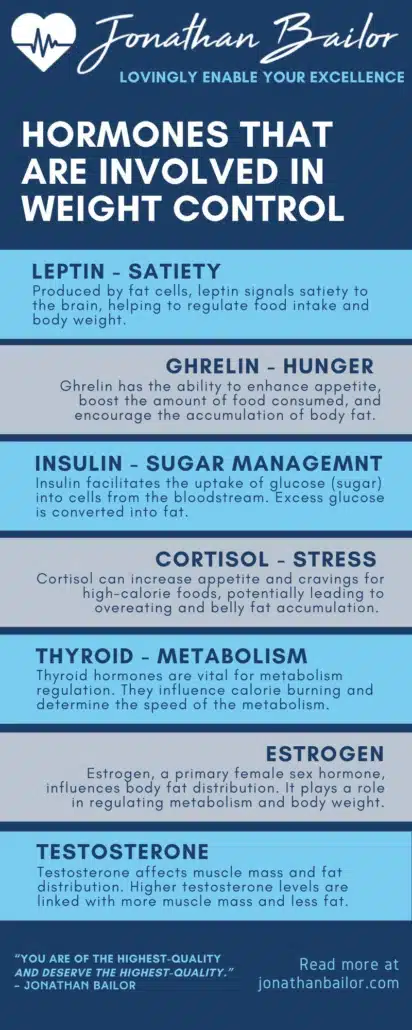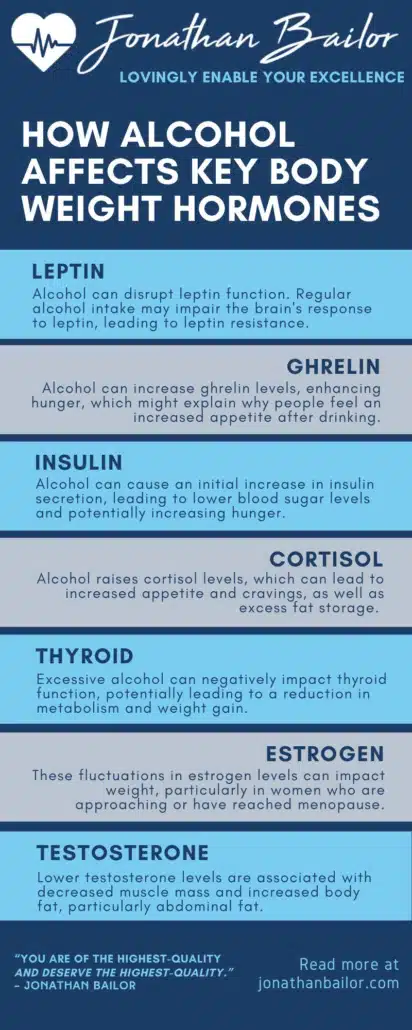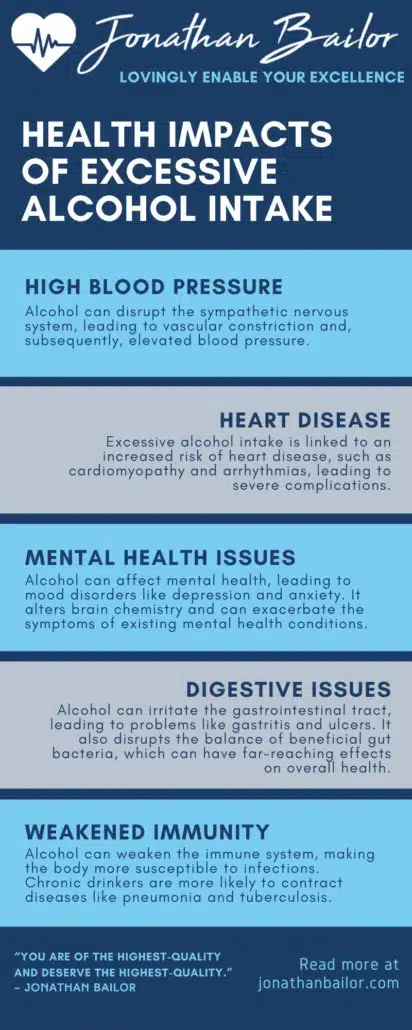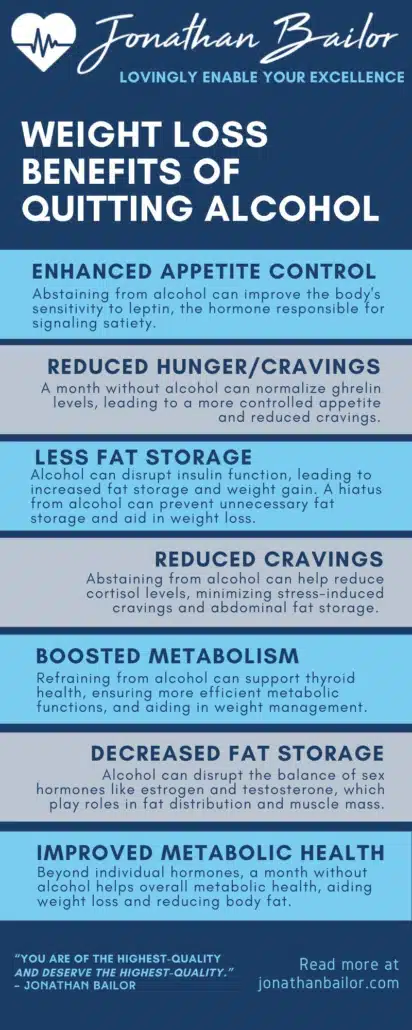Dry January 2024: Weight Loss and Hormonal Benefits of Quitting Alcohol
Are you ready to experience the weight loss and hormonal benefits of quitting alcohol in 2024? Here is a wealth of information on the effects of alcohol on hormones and body weight, along with the benefits of quitting drinking for a month, in this hormone health guide with Jonathan Bailor.
As the festive cheers of the holiday season fade into the calm of January, many of us embrace the tradition of ‘Dry January’—a month dedicated to abstaining from alcohol. This annual reset is not just a trend but a gateway to profound health benefits, especially in the realms of hormonal balance and weight management.
For years, alcohol has been a ubiquitous component of social gatherings and a go-to relaxant for many. However, its impact on our bodies, particularly regarding weight control and hormonal health, often remains under-discussed. It’s crucial to understand that the body’s weight regulation is not just about calories in versus calories out; it’s a sophisticated dance of hormones where each player has a vital role. Alcohol, while it may bring temporary euphoria, can disrupt this delicate balance, leading to unintended health consequences.
By taking a break from alcohol, you’re not just cutting down on liquid calories; you’re giving your body a chance to recalibrate its hormonal responses, which can have a cascading effect on your overall health and weight.
Dry January is more than a month of abstention; it’s an opportunity to reset, reflect, and reevaluate our relationship with alcohol.During a period of abstaining from alcohol, the body’s natural hormonal balance can be restored which can lead to weight loss and better metabolic health. The benefits extend beyond just the physical; many who participate in Dry January report feeling more energized, having better sleep quality, and experiencing a clearer mind.
This journey through Dry January is an exploration of how stepping away from alcohol can lead to a rejuvenated body and mind. It’s about understanding the intrinsic connection between what we consume and how our bodies function. The insights gained during this month can be a stepping stone to a healthier, more balanced lifestyle.
As you embark on this Dry January journey, remember that every step you take is a step towards better health. It’s not about deprivation but about empowerment—the power to control what goes into your body and its profound impact on your well-being. This month can be a transformative experience, revealing your body’s remarkable resilience and adaptability.
So, here’s to Dry January 2024—a toast to health, balance, and new beginnings! Remember, sharing this journey can inspire others. Let’s spread the word about the benefits of an alcohol-free month and how it can be a catalyst for lasting change in our lives and the lives of those around us. Share this message with friends and family, and let’s build a community dedicated to health and well-being.
Navigating the Hormonal Maze: Key Players in Weight Loss and Weight Management
As we journey to understand weight management, we often overlook the silent yet powerful influencers within our bodies: hormones. These biochemical messengers are pivotal in regulating our weight, appetite, and overall metabolic health. So, hormonal weight gain is a valid health and weight issue.
Each hormone has a unique function, working in harmony to maintain balance. Unraveling their roles provides insights into how our bodies function and how we can better manage our weight. Here’s a closer look at some critical hormones significantly impacting body weight and weight management.
1. Leptin: The Satiety Hormone
Produced by fat cells, leptin communicates with the brain, particularly the hypothalamus. It signals satiety, helping to regulate food intake and body weight. When leptin levels are optimal, it tells the brain that you have enough fat stored, reducing appetite and encouraging calorie burning, which helps you lose weight. However, issues arise with leptin resistance, often seen in obesity, where the brain doesn’t recognize leptin signals, leading to overeating despite adequate fat stores. Addressing leptin resistance is crucial for effective weight management.
2. Ghrelin: The Hunger Hormone
Ghrelin, primarily secreted by the stomach, plays the opposite role of leptin. It has the ability to enhance the desire to eat, boost the amount of food consumed, and encourage the accumulation of body fat. Ghrelin levels typically rise before a meal, signaling hunger, and fall after eating. Weight loss can increase ghrelin levels, which might explain why maintaining weight loss can be challenging. Understanding and managing ghrelin’s effects can be critical to long-term weight control.
3. Insulin: The Sugar Regulator
Insulin, produced by the pancreas, is crucial for regulating blood sugar levels and energy storage. It facilitates the uptake of glucose (sugar) into cells from the bloodstream. Excess glucose is converted into fat. High insulin levels, often caused by insulin resistance or a diet high in sugar and refined carbs, can increase fat storage and weight gain. Managing insulin levels through diet and lifestyle is a cornerstone of weight management.
4. Cortisol: The Stress Hormone
Cortisol, released by the adrenal glands during stress, has a complex relationship with weight. It can increase your appetite and cravings for high-calorie foods. Chronic high cortisol levels can lead to overeating and abdominal fat accumulation. Understanding stress’s role in weight management is essential, as reducing stress can help regulate cortisol levels and support weight-loss efforts.
5. Thyroid Hormones: Metabolic Regulators
Thyroid hormones, including T3 and T4, are produced by the thyroid gland and are vital for metabolism regulation. They influence calorie burning and determine how fast or slow the metabolism works. Hypothyroidism, a condition where the thyroid doesn’t produce enough hormones, can lead to weight gain and a sluggish metabolism. Proper thyroid function is critical for maintaining a healthy weight.
6. Estrogen: The Female Hormone
Estrogen, a primary female sex hormone, influences body fat distribution. It plays a role in regulating metabolism and body weight. Low estrogen levels, often seen in menopause, can lead to weight gain, especially around the abdomen. Balancing estrogen levels through diet, lifestyle, and medical guidance can help manage weight, particularly in women during menopause.
7. Testosterone: The Male Hormone
Testosterone, predominantly a male hormone, affects muscle mass and fat distribution. Higher testosterone levels are associated with increased muscle mass and reduced body fat. Low testosterone can lead to weight gain, muscle loss, and fat accumulation. Ensuring optimal testosterone levels can aid in maintaining healthy body composition.
Understanding these hormones and their roles in weight management empowers us to make informed decisions about our health and lifestyle. For certain individuals, weight loss drugs may be an option to address specific hormonal imbalances or challenges in weight management. These drugs should always be considered carefully and in consultation with a healthcare provider.
By recognizing the intricate hormonal interplay, we can tailor our approach to weight loss and maintenance, leading to more sustainable and effective outcomes.

Feeling Better Is Priceless, That's Why We Don't Put A Price On It!
“It’s Like A Free and Medically Valid Version of Noom and Weight Watchers Online”
~ Dr. Doctor Matthew Oleshiak, MD
Click the 'LEARN MORE' button below for free lifetime access to the fast fix program developed by Jonathan and top Ivy League Medical Doctors
LEARN MOREP.S. It's not a free trial. It's not part of the program for free. The entire program is free, forever, for real! No credit card needed.
Unveiling the Impact: How Alcohol Influences Key Hormones in Weight Management
Navigating the intricate landscape of weight management, it becomes evident that hormones are pivotal actors in this complex process. However, what’s often less discussed is the profound influence that alcohol has on these hormonal players. Alcohol, a common element in social settings and relaxation routines, can significantly disrupt the delicate hormonal balance that governs our body weight and metabolism.
This section explores the nuanced ways alcohol interacts with each of the seven key hormones above: leptin, ghrelin, insulin, cortisol, thyroid hormones, estrogen, and testosterone. Understanding these interactions is crucial for anyone seeking a holistic approach to weight management, especially considering the role of lifestyle choices in hormonal health.
1. Leptin
Alcohol can disrupt the proper functioning of leptin. Regular alcohol intake may impair the brain’s response to leptin, leading to leptin resistance. This resistance can result in the brain not receiving the signal that the body has stored enough energy, potentially causing overeating and weight gain.
2. Ghrelin
Alcohol can increase ghrelin levels, thus enhancing the sensation of hunger. This might explain why people often feel an increase in appetite or cravings for food, particularly high-calorie or fatty foods, after consuming alcohol.
3. Insulin
Alcohol can have a complex impact on insulin. It can cause an initial increase in insulin secretion, leading to lower blood sugar levels and potentially increasing hunger. Additionally, chronic alcohol consumption can contribute to insulin resistance, a significant factor in weight gain and metabolic disorders like type 2 diabetes.
4. Cortisol
Alcohol consumption elevates cortisol levels, known as the stress hormone. Elevated cortisol can lead to increased appetite and cravings, as well as a propensity to store fat, particularly in the abdominal area.
5. Thyroid Hormones (T3 and T4)
Excessive alcohol intake can negatively impact thyroid function, potentially leading to a reduction in thyroid hormone levels. This reduction can slow down metabolic processes, contributing to weight gain and difficulty losing weight.
6. Estrogen
Alcohol can affect estrogen levels, particularly in women. It can either increase or decrease estrogen, depending on various factors, including the amount of alcohol consumed. These fluctuations in estrogen levels can impact weight, particularly in women who are approaching or have reached menopause.
7. Testosterone
In men, excessive alcohol consumption can lead to a decrease in testosterone levels. Lower testosterone levels are associated with decreased muscle mass and increased body fat, particularly abdominal fat.
In summary, while moderate alcohol consumption may have a minimal impact, chronic or excessive alcohol abuse can significantly disrupt the hormonal balance related to weight management. These disruptions can contribute to weight gain and difficulty losing weight, highlighting the importance of moderation in alcohol consumption.

Beyond Weight: Understanding the Broader Health Impacts of Alcohol Consumption
Alcohol consumption, especially when excessive, has a wide range of physical and mental health effects beyond its impact on weight. These effects underscore the importance of moderation or abstention to maintain optimal health.
- High Blood Pressure: Regular alcohol consumption can lead to an increase in blood pressure, a key risk factor for heart disease and stroke. Alcohol can disrupt the sympathetic nervous system, leading to vascular constriction and, subsequently, elevated blood pressure.
- Liver Disease: Alcohol is a known hepatotoxin, meaning it can damage liver cells. Chronic drinking can lead to conditions like fatty liver, alcoholic hepatitis, fibrosis, and cirrhosis, significantly impairing liver function.
- Heart Disease or Cardiovascular Disease: Excessive alcohol intake is linked to an increased risk of heart disease. It can cause cardiomyopathy, a condition where the heart muscle weakens, and arrhythmias, which are irregular heartbeats, both of which can lead to severe complications.
- Metabolic Syndrome: Alcohol can contribute to the development of metabolic syndrome, a cluster of conditions including high blood sugar, increased abdominal fat, and abnormal cholesterol levels, which elevate the risk of heart disease, stroke, and diabetes.
- Mental Health Issues: Alcohol can affect mental health, leading to mood disorders like depression and anxiety. It alters brain chemistry and can exacerbate the symptoms of existing mental health conditions.
- Increased Cancer Risk: Chronic alcohol consumption has been linked to an increased risk of several types of cancer, including liver, breast, esophagus, and colorectal cancer. Studies have found that it can significantly increase breast cancer risk in women. Alcohol acts as a carcinogen and can also enhance the carcinogenic effects of other substances.
- Weakened Immune System: Alcohol can weaken the immune system, making the body more susceptible to infections. Chronic drinkers are more likely to contract diseases like pneumonia and tuberculosis.
- Digestive Issues: Alcohol can irritate the gastrointestinal tract, leading to problems like gastritis and ulcers. It also disrupts the balance of beneficial gut bacteria, which can have far-reaching effects on overall health.
- Pancreatitis: Heavy alcohol use is a primary cause of both acute and chronic pancreatitis, a painful condition that occurs when the pancreas becomes inflamed.
Understanding these varied health impacts of alcohol consumption underscores the importance of thoughtful drinking habits or choosing to abstain for overall health and well-being.

Hormonal Harmony: Positive Effects of a Month Without Alcohol on Weight and Health
Embracing a month without alcohol can be a transformative experience for your body, especially concerning hormonal balance and its cascading effects on weight and overall health. Alcohol’s intricate impact on hormonal systems often goes unnoticed, yet it plays a significant role in our body’s weight management and metabolic processes.
In this exploration, we’ll uncover how abstaining from alcohol for a month can realign these hormonal pathways, leading to a healthy body weight, reduced body fat, and enhanced overall well-being. The journey of understanding these changes highlights the power of our lifestyle choices on our body’s intricate systems.
1. Enhanced Appetite Control
Abstaining from alcohol can improve the body’s sensitivity to leptin, the hormone responsible for signaling satiety. Alcohol can interfere with the brain’s ability to receive and process leptin signals, leading to overeating. A break from alcohol helps to reset this pathway, potentially reducing appetite and aiding in better control over food intake, contributing to weight loss and a reduction in body fat.
2. Reduced Hunger and Food Cravings
Ghrelin, known as the hunger hormone, can be elevated by alcohol consumption, increasing the sensation of hunger and the likelihood of overeating. A month without alcohol can normalize ghrelin levels, leading to a more controlled appetite and reduced cravings. This change can significantly contribute to weight management and prevent overconsumption of calories.
3. Less Fat Storage
Alcohol can disrupt insulin function, leading to increased fat storage and weight gain. A hiatus from alcohol aids in stabilizing insulin levels and enhances its efficiency in glucose metabolism. This improved regulation can prevent unnecessary fat storage and aid in weight loss, especially by reducing visceral fat.
4. Reduced Cravings and Belly Fat Storage
Chronic alcohol consumption can elevate cortisol levels, promoting fat accumulation, particularly in the abdominal area. Abstaining from alcohol can help reduce cortisol levels, minimizing stress-induced cravings and the propensity for abdominal fat storage. This hormonal adjustment can be critical in achieving a healthier body composition.
5. Boosted Metabolism
Thyroid hormones are crucial for metabolic processes. Alcohol can impair thyroid hormone production, slowing metabolism and contributing to weight gain. Refraining from alcohol can support thyroid health, ensuring more efficient metabolic functions, and aiding in weight management.
6. Decreased Fat Storage
Alcohol can disrupt the balance of sex hormones like estrogen and testosterone, which play roles in fat distribution and muscle mass. A break from alcohol helps in rebalancing these hormones, which can decrease fat storage and increase lean muscle mass, contributing to a healthier body composition and weight.
7. Enhanced Overall Metabolic Health
Beyond individual hormones, a month without alcohol contributes to overall metabolic health. Improved liver function, better sleep patterns, and enhanced nutrient absorption all play a role in hormonal balance, contributing to weight loss and reduced body fat. This holistic improvement sets the stage for long-term health benefits.
While lifestyle changes like quitting alcohol can significantly impact weight management, certain individuals may also benefit from weight loss drugs under medical supervision. These drugs are not suitable for everyone but may complement hormonal improvements for some.
In summary, a month off from alcohol is not just a brief hiatus but a catalyst for profound hormonal and metabolic changes. These changes can lead to significant improvements in weight management and overall health, highlighting the importance of our lifestyle choices in shaping our health and well-being.

Recognizing the Signs: When to Seek Medical Help for Alcohol Dependence
Identifying and acknowledging alcohol dependence is a crucial step toward recovery. If alcohol consumption is impacting daily life, relationships, or work, it’s time to consult a doctor. Warning signs include inability to limit drinking, intense cravings for alcohol, severe withdrawal symptoms like shaking or nausea when not drinking, and a growing tolerance to alcohol’s effects. Seeking medical assistance is vital if drinking causes anxiety or depression or if there’s a history of alcohol-related health issues. A healthcare professional can provide guidance, support, and addiction treatment options, paving the way for a healthier, alcohol-independent life. Remember, reaching out for help is a sign of strength, not weakness.
Hormone Health: Addressing Your Frequently Asked Questions
Hormonal health is a topic of growing interest and importance, particularly as we seek to understand the profound impact hormones have on our overall well-being. The following are some frequently asked questions about hormone health, providing insights and clarity on this essential subject.
1. What role do hormones play in weight management?
Hormones are crucial regulators in weight management, acting as messengers that influence appetite, metabolism, and fat storage. Hormones like leptin and ghrelin control hunger and fullness cues, while insulin manages blood sugar levels and fat storage.
Disruptions in these hormonal signals can lead to weight gain or difficulty losing weight. Balancing these hormones through a healthy lifestyle is key to effective weight management.
In some cases, weight loss drugs may be recommended for compatible individuals who face challenges in achieving balance through lifestyle changes alone. These medications work alongside hormonal processes but require medical guidance for safe use.
2. How does sleep affect hormonal balance?
Quality sleep is vital for hormonal balance. Lack of sleep can disrupt the production of critical hormones, including growth hormone, cortisol, leptin, and ghrelin. Poor sleep can lead to elevated cortisol levels (stress hormone), increased appetite, reduced satiety, and even insulin resistance.
Ensuring adequate and restful sleep is an essential step in maintaining hormonal health.
3. Can diet influence hormonal health?
Yes, diet plays a significant role in hormonal health. Foods high in refined sugars and unhealthy fats can disrupt hormonal balance, leading to issues like insulin resistance and inflammation. A diet rich in whole foods, fibers, healthy fats, and proteins can support hormonal balance.
Foods like leafy greens, nuts, seeds, and lean proteins are particularly beneficial for maintaining hormonal equilibrium.
4. Are there specific lifestyle changes that can improve hormonal health?
Several lifestyle changes can positively impact hormonal health. Regular physical activity can enhance insulin sensitivity and balance stress hormones. Managing stress through practices like mindfulness, yoga, or meditation can lower cortisol levels. Avoiding excessive alcohol and staying hydrated is also essential for maintaining hormonal balance.
Adopting these lifestyle habits can lead to significant improvements in hormonal health.
5. How does menopause affect hormonal health?
Menopause marks a significant change in a woman’s hormonal landscape, primarily characterized by a decrease in estrogen and progesterone production. This shift can lead to various symptoms, like hot flashes, mood swings, and weight gain, particularly around the abdomen.
Adopting a healthy lifestyle with a balanced diet, regular exercise, and stress management can help mitigate these effects and maintain hormonal health during menopause.
Understanding hormone health is a journey into the intricate workings of our body. By addressing these common inquiries, we can take proactive steps toward maintaining a harmonious hormonal balance, paving the way for improved health and well-being.
Embracing Hormonal Health: A Journey to Share
Our exploration into the world of hormonal health reveals the profound impact that lifestyle choices, such as abstaining from alcohol, have on our well-being. This journey highlights the intricate relationship between hormones, weight management, and overall health.
However, eating a healthy diet, practicing healthy eating habits, getting enough sleep, managing stress levels, cutting back on processed foods, and getting regular exercise are still important and can enhance the weight-loss effects of quitting alcohol.
As we close this chapter, let’s not keep these insights to ourselves. Share this treasure trove of knowledge with friends and family across all social media platforms and via email. Spark conversations, ignite a collective journey towards better health and watch these ripples of change transform lives. Together, let’s embrace and share the path to hormonal harmony.
Feeling Better Is Priceless, That's Why We Don't Put A Price On It!
“It’s Like A Free and Medically Valid Version of Noom and Weight Watchers Online”
~ Dr. Doctor Matthew Oleshiak, MD
Click the 'LEARN MORE' button below for free lifetime access to the fast fix program developed by Jonathan and top Ivy League Medical Doctors
LEARN MOREP.S. It's not a free trial. It's not part of the program for free. The entire program is free, forever, for real! No credit card needed.




